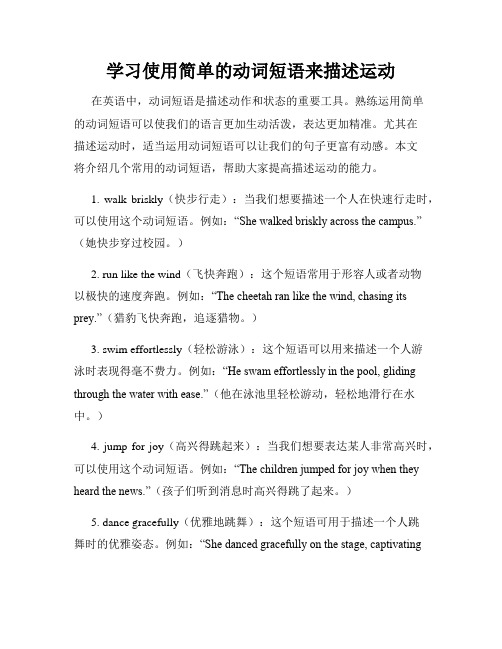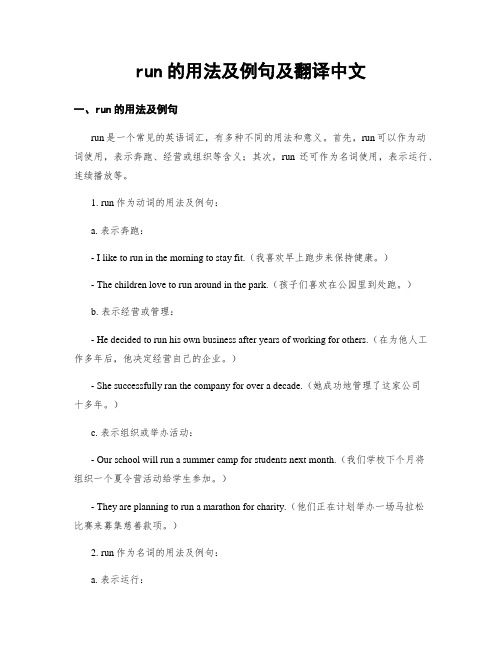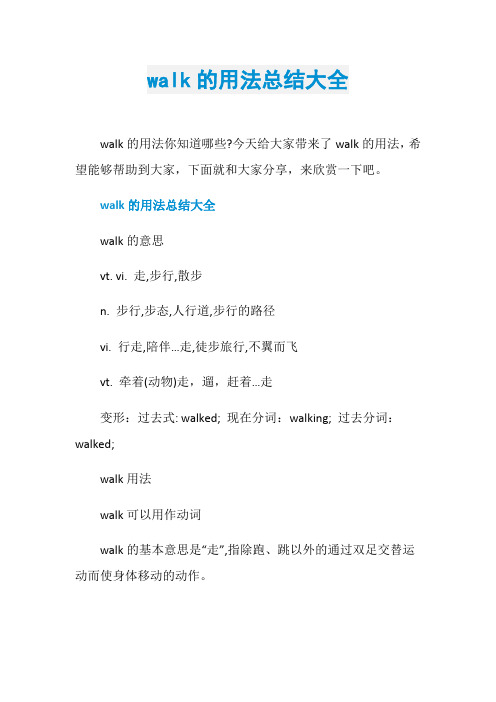英语中表示走和跑的词语用法小结
学习使用简单的动词短语来描述运动

学习使用简单的动词短语来描述运动在英语中,动词短语是描述动作和状态的重要工具。
熟练运用简单的动词短语可以使我们的语言更加生动活泼,表达更加精准。
尤其在描述运动时,适当运用动词短语可以让我们的句子更富有动感。
本文将介绍几个常用的动词短语,帮助大家提高描述运动的能力。
1. walk briskly(快步行走):当我们想要描述一个人在快速行走时,可以使用这个动词短语。
例如:“She walked briskly across the campus.”(她快步穿过校园。
)2. run like the wind(飞快奔跑):这个短语常用于形容人或者动物以极快的速度奔跑。
例如:“The cheetah ran like the wind, chasing its prey.”(猎豹飞快奔跑,追逐猎物。
)3. swim effortlessly(轻松游泳):这个短语可以用来描述一个人游泳时表现得毫不费力。
例如:“He swam effortlessly in the pool, gliding through the water with ease.”(他在泳池里轻松游动,轻松地滑行在水中。
)4. jump for joy(高兴得跳起来):当我们想要表达某人非常高兴时,可以使用这个动词短语。
例如:“The children jumped for joy when they heard the news.”(孩子们听到消息时高兴得跳了起来。
)5. dance gracefully(优雅地跳舞):这个短语可用于描述一个人跳舞时的优雅姿态。
例如:“She danced gracefully on the stage, captivatingthe audience with her fluid movemen ts.”(她在舞台上优雅地舞蹈,用她流畅的动作吸引了观众的注意。
)6. climb steadily(稳步攀爬):当我们描述一个人缓慢但稳定地爬山或攀爬物体时,可以使用这个动词短语。
go短语归纳总结

go短语归纳总结短语是英语中非常重要的语言元素之一,能够丰富句子的表达方式,增加语言的灵活性和准确性。
GO短语是指以"go"为核心的短语,根据不同的语境和意义,它们可以表达出各种不同的含义。
本文将对一些常见的GO短语进行归纳总结,以方便读者更好地掌握和运用。
一、表达移动和前进的GO短语1. go ahead:前进,继续,进行例句:You can go ahead and start without me.(你可以继续开始,我来迟一点。
)2. go away:走开,离开例句:Go away and leave me alone!(走开,别烦我!)3. go off:离开,离去;(闹钟、炸弹等)响起,爆炸例句:He went off early this morning.(他今早离开了。
)The alarm clock went off at 7 am.(闹钟在早上7点响了。
)4. go out:出去,外出;熄灭,熄掉例句:She often goes out for a walk in the evening.(她经常在晚上出去散步。
)The candle went out when the window was opened.(窗户一打开,蜡烛就熄灭了。
)5. go up:上升,增长例句:The price of oil has gone up recently.(最近石油的价格上涨了。
)二、表达尝试和努力的GO短语1. go for:尝试获得,争取例句:He is going for the championship this year.(他今年争取夺冠。
)2. go on:继续,进行下去例句:Please go on with your story.(请继续讲你的故事。
)3. go about:着手做,开始处理例句:How do we go about solving this problem?(我们该如何着手解决这个问题?)4. go after:追求,追逐例句:He went after his dreams and became a successful musician.(他追逐梦想,成为一名成功的音乐家。
run的用法和搭配

run的用法和搭配一、基本含义Run是一个常用的英语动词,意为“跑”或“运行”。
在句子中可以作为谓语使用,表示某个动作或状态。
二、搭配与用法1. run+副词:表示跑的动作,可以搭配不同副词,例如run quickly(快跑)、run slowly(慢跑)等。
例句:The children ran quickly across the playground.(孩子们飞快地跑过操场。
)2. run+介词+名词:表示某物移动或发生的位置,可以搭配不同的介词,例如run from(从…逃跑)、run to(通向…的路)等。
例句:The children ran to the park after school.(放学后孩子们跑向公园。
)3. run+副词+比较级:表示跑步的比较,可以与其他人或事物进行比较。
例句:My dog runs faster than my friend's dog.(我的狗比朋友家的狗跑得快。
)4. run+名词+ed:表示某物已经停止或结束的状态,可以搭配不同的过去分词,例如run out(用完)、run over(撞车)等。
例句:I ran out of time and couldn't finish my homework.(我没时间完成作业了。
)5. run+形容词+副词:表示跑步的品质或特点,例如running fast(跑得快)、running well(跑得好)等。
例句:The athlete runs well and always finishes the race in the top three.(这个运动员跑得很好,总是在前三名以内完成比赛。
)6. 常用搭配:run away/off(逃跑)、run out of(用完)、run into(撞上)等。
例句:The thief ran away after stealing the money.(小偷偷了钱后逃跑了。
walk的用法和短语例句翻译阅读

walk的用法和短语例句翻译阅读walk有步行;陪...走;散步;偷走等意思,那么你知道walk的用法吗?下面跟着学习啦我一起来学习walk的用法和〔短语〕例句吧,希望对大家的学习有所关怀!walk的用法walk的用法1:walk的基本意思是"走',指除跑、跳以外的通过双足交替运动而使身体移动的动作。
walk的用法2:walk既可用作及物动词,也可用作不及物动词。
用作及物动词时,可接表示人或动物的名词作宾语,意为"教〔扶〕某人走路'"遛(马、狗等)'; 接表示地点的名词作宾语,意为"在走动'; 也可接以形容词充当宾语补足语的复合宾语。
walk用作不及物动词侧重运动方式时常译作"走(路),步行',侧重运动目的时常译作"散步',常伴随表示距离、地点或方向的状语。
walk的用法3:walk可用作系动词,后接形容词作表语。
walk的用法4:walk还可作"执行任务,徒步测量'解。
walk的用法5:walk用作名词时的基本意思是"步,步行',尤指为了散步或锻炼的步行,引申可作"步行的距离'"走路的步态'"步行的速度'"散步的场所'"步行的路径'解。
walk的用法6:walk用作单数可数名词时,常与不定冠词a或an连用。
walk的常用短语walk about〔around〕(v.+adv.)walk abroadwalk ahead (v.+adv.)walk away (v.+adv.)walk away from (v.+adv.+prep.)walk away〔off〕with (v.+adv.+prep.)walk back (v.+adv.)walk in (v.+adv.)walk into (v.+prep.)walk off1 (v.+adv.)walk off2 (v.+prep.)walk on1 (v.+adv.)walk on2 (v.+prep.)walk out (v.+adv.)walk out on (v.+adv.+prep.)walk over1 (v.+adv.)walk over2 (v.+prep.)walk round (v.+adv.)walk的用法例句1. Do not wait for good things to happen to you. You need to walk towards happiness.不要等待好事降落,你要向美妙进发。
run的用法及其词组解释翻译

run的用法及其词组解释翻译一、run的用法及基本解释Run是一个常用的动词,在英语中有多种含义和用法。
下面将对其常见的用法及基本解释进行详细介绍。
1. 表示快速移动或奔跑“run”最常见的意思就是“奔跑”,可以涵盖从慢慢移动到飞奔等各种速度范围。
例如:“He ran to catch the bus.”(他跑着赶上了公交车。
)2. 经营或管理Run还可以表示经营或管理某事物。
这个意思通常与企业、机构或项目相关。
“I want to run my own business.”(我想经营自己的生意。
)3. 处于状态或持续运行Run还可以形容事物处于某种状态或持续运行。
“The car is running smoothly.”(汽车在顺利行驶。
),“The computer runs all day and night without turning off.”(电脑日夜不停地运行着。
)4. 进行比赛或竞选Run也可表示参加比赛、竞选等活动。
“She is running for president.”(她正在竞选总统职位)。
这里“running”指的是参与竞选活动。
二、run的常见词组和翻译下面列举了一些常见的以“run”为主要词汇的词组,并提供了相应的翻译。
1. run out of (用完,耗尽)Running out of something 意味着某个物品已经用完或者快用完。
“I ran out of milk, so I need to buy more.”(我牛奶用完了,所以需要再买一些。
)2. run into (偶然遇见)Run into意味着偶然遇见某人或发生某种情况。
“I ran into my old friend at the supermarket yesterday.”(昨天我在超市里偶遇到一个老朋友。
)3. run over (撞倒,碾压)Run over是指车辆撞倒或压过某个物体。
run的用法及例句及翻译中文

run的用法及例句及翻译中文一、run的用法及例句run是一个常见的英语词汇,有多种不同的用法和意义。
首先,run可以作为动词使用,表示奔跑、经营或组织等含义;其次,run还可作为名词使用,表示运行、连续播放等。
1. run作为动词的用法及例句:a. 表示奔跑:- I like to run in the morning to stay fit.(我喜欢早上跑步来保持健康。
)- The children love to run around in the park.(孩子们喜欢在公园里到处跑。
)b. 表示经营或管理:- He decided to run his own business after years of working for others.(在为他人工作多年后,他决定经营自己的企业。
)- She successfully ran the company for over a decade.(她成功地管理了这家公司十多年。
)c. 表示组织或举办活动:- Our school will run a summer camp for students next month.(我们学校下个月将组织一个夏令营活动给学生参加。
)- They are planning to run a marathon for charity.(他们正在计划举办一场马拉松比赛来募集慈善款项。
)2. run作为名词的用法及例句:a. 表示运行:- The run of the machine can be controlled by a simple switch.(这台机器的运行可以通过简单的开关控制。
)- I forgot to turn off my computer before leaving, so it was on a continuous run.(在离开前我忘记关电脑了,所以它一直在运行。
)b. 表示连续播放:- We watched a movie marathon and had a run of four films in one night.(我们看了一场电影马拉松,在一个晚上看了连续播放的四部电影。
run的用法和短语例句

run的用法和短语例句run有跑;行驶;运转;运营;持续;蔓延;传播;竞选;遭遇等意思,那么你知道run的用法吗?下面跟着店铺一起来学习一下,希望对大家的学习有所帮助!run的用法:run的用法1:run的基本意思是“跑”“移动”,指人、动物或车辆以一定速度前进或移动,引申可表示“(使)流动”,指水流、血液或眼泪比较湍急、源源不断地在一段时间内流淌。
用在日常非正式场合时,还可表示“操纵”“管理”,指使具体事物或企业按照人的意志进行或发展。
引申可表示“延伸”“延续”等。
run的用法2:run主要用作不及物动词,也可用作及物动词。
用作及物动词时,接名词、代词或由that引导的从句作宾语,有时还可接双宾语,其间接宾语可转化成介词to或for的宾语。
可用于被动结构。
run 用作不及物动词时其后可跟动词不定式作状语,不定式符号to有时可以省略。
run的用法3:run还可用作系动词,意思是“用”“达到”“变得”,常接形容词作表语。
用于比赛时可接序数词,表示“跑第几名”。
run的用法4:run的现在进行时可表示按计划或安排、打算将要发生的动作,此时句中一般有表明将来的时间状语或特定的上下文。
run的用法5:run的过去式是ran,过去分词是run。
run的用法6:run作“管理”解时是非正式用语,正式场合应该用operate或manage。
run的常用短语:run about (v.+adv.)run across1 (v.+adv.)run across2 (v.+prep.)run after (v.+prep.)run against (v.+prep.)run along1 (v.+adv.)run along2 (v.+prep.)run around (v.+adv.)run at (v.+prep.)run away (v.+adv.)run away/off with (v.+adv.+prep.)run back (v.+adv.)run back over (v.+adv.+prep.)run down1 (v.+adv.)run down2 (v.+prep.)run for (v.+prep.)run in (v.+adv.)run into (v.+prep.)run的用法例句:1. The ballot was re-run on Mr Todd's insistence after accusations of malpractice.因被控舞弊,在托德先生的坚持下重新进行了投票。
run的用法及短语

run的用法及短语一级标题:深入探索run的用法及短语二级标题1:run的基本含义和用法在英语中,动词"run"是一个非常常见且多功能的词汇。
它可以作为不同语境下的名词、动词和短语使用,具有多种含义和用法。
作为一个动词,最基本的意思是移动快速地行走或奔跑。
例如,在运动场上看到一位运动员以高速奔跑,我们会说,“The athlete is running.”(运动员在跑步)。
此外,在日常生活中,我们也会用“run”来描述某人用较高的速度前往某地。
“I need to run to the store to buy some groceries.”(我需要去商店买些杂货。
)除了描述移动快速行走之外,"run"还可用于指代控制或领导某物、某组织或机构的操作。
比如,“He runs a successful business.”(他经营着一家成功的公司)这句话表明该人负责管理并主导业务发展。
由此可见,“run”也可以表示对某事物进行操作或管理。
二级标题2:与"run"相关的常用短语1. run out of (用尽)当你使用完所有资源时,你会说"I have run out of milk."(我的牛奶用完了)或"I ran out of time."(我没有时间了). 这个短语表示某物已经耗尽,不再可用。
2. run into (遇到)当你偶然碰到一个朋友或与某种困难相遇时,可以使用这个短语。
“I ran into Jane at the grocery store.”(我在杂货店里碰到了简)。
这里"run into"表示一个非计划的会面。
3. run away (逃跑)当某人因害怕、紧张或其他原因离开某地时,我们可以用这个短语。
例如,“The dog ran away when it heard fireworks.”(那只狗听到烟花声后跑掉了).4. run for (竞选;争取)这个短语通常用于描述参加选举或争取职位的行为。
run的用法及例句翻译中文

run的用法及例句翻译中文一、Run的常见用法在英语中,动词"run"是一个非常常见且多功能的词汇。
它可以表示多种意思,并且可以用于不同的语境和句型。
下面将详细介绍run的几个主要用法。
1. 表示奔跑或快速移动最基本的含义是表示奔跑或快速移动。
例如:- The children ran through the field, laughing happily.(孩子们在田野里奔跑着,开心地笑着)- He ran to catch the bus but missed it.(他艰难地追赶公交车,但却错过了它)2. 表示管理或经营"Run"还可以表示管理、经营或指导某个组织、机构或活动。
例如:- Jane runs her own small business.(简经营着自己的小企业)- Who runs this conference?(这次会议由谁负责?)3. 表示操作某物或使其运转起来"Run"也可指操作某物或使其运转起来,表达使用电器、机器等行为。
例如:- Can you run the washing machine for me?(你能帮我开洗衣机吗?)- The technician ran some tests on the computer to diagnose the problem.(技术员对电脑进行了一些测试,以诊断问题)4. 表示整体方向或路径此外,"run"还可以表示整体的方向或路径。
例如:- The river runs through the middle of the city.(这条河流从城市中心流过)- The road runs parallel to the railway track.(这条路与铁轨平行)二、Run的例句翻译中文1. The children ran through the field, laughing happily.孩子们在田野里奔跑着,开心地笑着。
run做系动词的用法

run做系动词的用法
run作为系动词,其基本含义是“(使)流动;(使)流出”。
run
可以用作动词,也可以用作系动词,连接名词或形容词,构成固定搭配,
表示到达某种状态。
一、run作动证,其意思是“跑”,“奔跑”,常与动词不定式连用
表示一个动作的起止点,也可以单独作主语,表示“跑”的动作,如:He ran to the window. 他跑到窗户边。
The kids run in the park. 孩子们在公园里奔跑。
二、run作系动词,用来连接形容词或名词,表示“变成;具有”的意思,如:
The river runs red.河流变成红色。
His eyes ran with tears. 他眼中涌出泪水。
The wall runs for miles.这堵墙横跨数英里。
三、run还可以用在其他特殊结构中,如:
run into:碰见;碰到。
I ran into an old friend at the store. 我在商店里碰见了一个
老朋友。
run out:耗尽;用完。
We ran out of milk. 我们的牛奶用完了。
run down:把...(赶)撞倒。
The car ran down the pedestrian. 那辆车把行人撞倒了。
run off:逃走;离开。
He ran off without saying a word. 他一句话都没有说就跑了。
run up:累积;增加。
The bill has run up to a huge amount. 这笔账单已累积到一个巨大的数额。
run的用法及例句翻译

run的用法及例句翻译一、run的基本用法及例句解析1. run的基本意思和用法:动词"run"是英语中使用频率很高的一个词汇,它有多种意思和用法。
最常见且基本的含义是指“跑步”或“奔跑”,如:- I love to go for a run in the morning.(我喜欢在早上去跑步。
)- The children ran towards the playground.(孩子们向操场跑去。
)此外,“run”还可以表示其他运动方式,如“快速行走”或“疾驰”,比如:- She ran after the bus but couldn't catch it.(她追着公交车跑过去但没赶上。
)2. run作为及物动词时,可以表达更多不同的意义和用法,以下是几个常见的例子:2.1 表示管理或经营:- My parents used to run a small café downtown.(我父母过去在市区经营一个小咖啡馆。
)- He runs his own business and is very successful.(他经营自己的生意,并取得了很大成功。
)2.2 表示使运转或操作:- Can you help me run the washing machine?(你能帮我操作洗衣机吗?)- I often have to run several programs simultaneously on my computer.(我经常需要同时运行几个程序在我的电脑上。
)2.3 表示流动或通过:- The river runs through the middle of the city.(这条河流经城市中心。
)- Water was running down the walls after the heavy rain.(大雨之后水从墙上流下来。
)二、run的其他用法及例句解析1. run表示参加或举办活动时的运行或进行:- We ran a marathon last weekend.(上周末我们参加了一场马拉松比赛。
run一词多义用法

run一词多义用法"run" 是一个多义词,具有多个用法。
以下是一些常见的用法:1. 行动/奔跑:作为动词,表示快速移动的动作。
- I saw him running towards the bus stop.(我看见他向公交车站跑去。
)- Please run to the store and buy some bread.(请跑一趟商店买点面包。
)2. 经营/管理:作为动词,表示管理或经营某个组织、企业或活动。
- He runs a small business.(他经营着一家小生意。
)- They run a charity organization.(他们经营着一个慈善组织。
)3. 运行/操作:作为动词,表示机器、系统或计划的正常运行或使用。
- The computer is running slowly.(电脑运行得很慢。
)- Can you help me run this software?(你能帮我操作这个软件吗?)4. 参加/参与:作为动词,表示参加某个活动或参与其中。
- Are you planning to run in the marathon?(你打算参加马拉松吗?)- She ran for president in the last election.(她参加了上次的总统选举。
)5. 流动/涌出:作为动词,表示液体、颜色或物体流动或涌出。
- The river runs through the valley.(这条河流贯穿整个山谷。
) - Tears were running down her cheeks.(眼泪顺着她的脸颊流下来。
)6. 持续/延续:作为动词,表示某种状态或情况持续存在或持续发展。
- The meeting ran late.(会议结束得很晚。
)- This TV show has been running for 10 seasons.(这个电视节目已经播放了10季。
专题05 读后续写之各种“走”和“跑”-新高考英语读后续写考前冲刺读背素材

专题05读后续写之各种“走”和“跑”一、关键词各种“走”stroll闲逛mince碎步走toddle婴儿学步tiptoe蹑手蹑脚shuffle拖着脚走march列队走stride大步走strut趾高气扬地走stalk昂首阔步sneak鬼鬼祟祟地走sidle侧身走limp瘸着走stumble跌跌撞撞地走stagger蹒跚trudge吃力地走plod沉重缓慢地走wade涉水wander 漫步saunter 闲逛各种“路”1)avenue 大街;2)boulevard 林荫大道;3)walk, promenade 散步的路;4)ring road 环行路;5)alley 胡同;6)pavement 人行道,便道;7)pedestrian crossing 人行过街横道;8)public thoroughfare 街道;9)high street 大街,主要街道(英)10.main street主街道(美)11.along/up/down the street 沿着街道12. across the street 街对面13. on the other/opposite side of the street 在街道的另一边/对面14.side/back street 小路/偏僻街道15.crowded street 拥挤的街道16.one-way street 单行道17.street corner 街角二、常用短语1)sneak out of the house偷偷溜出2)give a jump in the air 跳到空中(表示开心)3)Jump to one’s feet 跳起来(表示震惊)4)make a running step back 跑着后退5)dash back 冲回6)Pace restlessly 不安地走动7)aimlessly 无目的地8)pop down a hole 跳入一个洞9)dig into one’s pocket 插入口袋10)Press one’s hand upon one’s heart 用手压住胸口(表示惊吓)11)stand a few moments without saying a word 无话可说地站在那里12)...flashed across her mind 闪过脑海13)start to one’s feet 站起来三、句子赏析1.Then Lisa stood up and made her way through the crowd toward me.2.Lisa planted her feet firmly in front of me.3.She managed to climb onto it and waited patiently.4.Reuben ran/rushed down Water Street, trembling with great panic.5.The shadows were lengthening when Reuben arrived at(动作) the factory. 6.Then, clutching the tin can, he headed for the shop.7.Racing home, Reuben burst through the front door.8.Disappointed and frustrated, the poor man made his way back to his family. 9.Suddenly, the woman stood up and entered the house in tears.10.And yet, they all just stood there staring at me, motionless.11.Belle Ringer nodded thoughtfully, and Frannie hurried off to wait on the rest of her tables.12.I led them toward a large corner booth. I could feel the rest of the staff following behind as we marched through the dining room.13.I dragged myself through daily chores, feeling exhausted.14.The elderly man fled away with great panic.15.The man stepped back/stepped onto the platform to take a good look at the paintings.16.He leapt to his feet and rushed out of the living room.17.He sprung from his chair and rushed to pick up the telephone.18.He jumped up and rushed out of the living room.19.She just sat there staring into space20.The kids sat around a campfire21.Please remain seated until your name is called.22.He seated himself comfortably at the foot of the bed.23.He took his usual seat at the front of the classroom.24.That man is hurt, he's limping.25.He was so drunk that he staggered all the way home.26.She stumbled upstairs and into bed.27.She tiptoed to the bed so as not to wake the baby.28.They strolled around the park.29.They enjoy wandering through the countryside.30.He paced up and down the platform, waiting for the train.31.Demonstrators marched through the streets of the city.32.A baby crawls before he can walk.33.Paul decided to edge away from the crowd.34.The cat crept silently towards the bird.35.The boy sneaked in without paying.36.I must dash or I'll miss the train.37.She goes jogging every day.38.He tripped over the step and fell.39.The group hiked up to the top of the hill.40.As I was sitting in the park, I watched as couples seemed to meander around happily.四、翻译练习1.这个运动员失去了平衡,向后趔趄摔倒了。
初中英语行为动词

初中英语行为动词行为动词是用来描述人或物发出的动作或行为的单词。
在英语中,行为动词是非常重要的一部分,因为它们帮助我们更准确地表达我们正在做的事情。
下面是一些常见的初中英语行为动词。
1. Walk(步行)- 表示用脚步行走。
例如:I walk to school every day.(我每天走路去学校。
)2. Run(跑步)- 表示以快速的速度奔跑。
例如:He runs in the park every morning.(他每天早上在公园里跑步。
)3. Eat(吃)- 表示进食。
例如:She eats breakfast at 7 o'clock.(她7点吃早餐。
)4. Drink(喝)- 表示喝水或其他饮料。
例如:They drink juice after dinner.(他们晚饭后喝果汁。
)5. Sleep(睡觉)- 表示休息或进入睡眠状态。
例如:I usually sleep for eight hours a night.(我通常每晚睡八小时。
)6. Study(学习)- 表示通过阅读、探索或进行讨论来获取知识。
例如:We study English every day.(我们每天学英语。
)7. Play(玩耍)- 表示进行娱乐或游戏活动。
例如:They play basketball after school.(他们放学后打篮球。
)8. Listen(听)- 表示通过听来接收信息。
例如:I like to listen to music in my free time.(我喜欢在闲暇时间听音乐。
)9. Speak(说话)- 表示用口头表达。
例如:She speaks three languages fluently.(她能流利地说三种语言。
)10. Write(写)- 表示用笔或键盘记录信息。
例如:He writes in his diary every night.(他每晚都在日记本上写字。
run的用法及其词组解释

run的用法及其词组解释一、run的用法及其词组解释1. run的基本用法"run"是一个常见的英语动词,有多种含义和用法。
首先,作为及物动词,"run"可指运行、奔跑或管理等。
例如:"He runs a successful business."(他经营一家成功的企业。
)此外,它还可以表示驱动机器或设备正常工作,如:"Can you help me run the washing machine?"(你能帮我启动洗衣机吗?)其次,作为不及物动词,“run”意味着快速移动脚步或身体部位。
例如:“The children are running in the park.”(孩子们在公园里跑步。
)此外,它还可以表示液体流动,如:"Water is running from the tap."(水从水龙头流出来。
)此外,在不同的语境下,“run”还可以有其他意义和用法。
2. “Run”的常见短语和习语:(1) run out of:用尽;耗尽例句:“I ran out of milk, so I couldn't make coffee this morning.”(我牛奶用完了,所以今天早上不能冲咖啡了。
)(2) run away:逃跑;离家出走例句:“The dog saw a squirrel and ran away into the woods.”(狗看到了松鼠,逃跑进了树林。
)(3) run into:偶然碰到;遭遇例句:“I ran into my old friend at the grocery store yesterday.”(昨天我在杂货店意外碰到了我的老朋友。
)(4) run for:参选;竞选例句:“She is running for president in the upcoming election.”(她正在竞选即将到来的总统选举。
run的用法总结 (2)

run的用法总结一、run的含义和基本用法run是一个常见的英语动词,有着多种不同的含义和用法。
在最基本的层面上,run表示快速地移动或奔跑。
例如:“我听到敲门声,就快速跑到门口打开了。
”(I heard a knock on the door, so I ran to open it.)另外,run也可以表示经营、管理或指挥某个组织、企业或活动等。
比如:“他在这家公司担任总监已经运营了十年。
”(He has been running this company as a director for ten years.)此外,在体育比赛中,run也指代着在径赛中进行赛跑。
二、run作为及物动词的用法1. run后接宾语+介词短语run常用于接宾语后再加介词短语。
例如,“我们需要尽快完成这个项目。
”(We need to run through this project as soon as possible.)在这个例子中,“through”是介词,表示完成某项任务。
2. run后接宾语+副词这种用法中,run通常会改变宾语的状态或表达某种结果。
例如,“我给那台旧电视机通电之后发现是坏的。
”(I ran the old TV and found it was broken.)在这个例子中,“ran”表示对电视机进行了一次测试。
三、run作为不及物动词的用法1. run + 副词短语这种用法表示在特定的方向或路径上移动。
例如,“孩子们高兴地沿着海滩奔跑。
”(The children ran happily along the beach.)2. run + 名词当run后接名词时,通常是指经营某个业务或运行某项活动。
例如,“这家公司已经稳定运行了五年。
”(This company has been running steadily for five years.)四、常见短语和习语中的run用法1. run out of (sth): 用尽,耗尽(某物)例如,“我们的咖啡用完了,需要再买一些。
英语go的用法总结

英语go的用法总结一、go的用法总结1. 不及物动词用法- 表示“去;走;离开”的基本动作方向,常与表示方向的介词或副词搭配。
- 表示“进行;进展”,描述事情的发展状态。
- 表示“变得”,用于描述状态的转变。
2. 系动词用法- 后接形容词作表语,表示主语的状态变化。
3. 与不同词性搭配形成多种短语动词- 与介词或副词搭配,形成新的语义。
二、英语释义- go [ɡəʊ]- v. (goes [ɡəʊz], went [went], gone [ɡɒn])- move from one place to another; travel; leave a place; be in a particular state or condition; work or function in a certain way; be used up; disappear三、短语1. go ahead- 英语释义:proceed without hesitation; continue or begin- 用法:可单独使用表示允许对方做某事,或用于鼓励对方继续做某事。
- 例句:Go ahead and open the present.(尽管打开礼物吧。
)2. go for- 英语释义:choose; attempt to get or achieve; be attracted by - 用法:go for sth.(选择某物;想要获得某物);go for sb.(喜欢某人;对某人感兴趣)- 例句:I think I'll go for the red dress.(我想我会选择那条红色的裙子。
) She really goes for him.(她真的很喜欢他。
)3. go on- 英语释义:continue; happen; keep talking- 用法:go on doing sth.(继续做某事,强调不间断);go on to do sth.(继续做另一件事);go on with sth.(继续某事)- 例句:He went on reading the book.(他继续读那本书。
英语动作单词

英语动作单词动作单词是英语中非常重要的一类词汇,它们描述了人或物体的行为和运动状态。
本文将介绍一些常见的英语动作单词及其用法。
1. Run (跑步):Run 是指快速移动双脚,前进的动作。
例如: I like to run in the morning.2. Walk (走路):Walk 是指慢慢地移动双脚,前进的动作。
例如: Let's take a walk in the park.3. Jump (跳跃):Jump 是指用力腾起身体,离开地面。
例如: The little girl likes to jump on the bed.4. Climb (攀爬):Climb 是指用手和脚上下攀爬。
例如: The cat climbed up the tree to catch the bird.5. Swim (游泳):Swim 是指在水中移动身体,用手和脚划动水面。
例如: We went swimming in the lake yesterday.6. Dance (跳舞):Dance 是指随着音乐的节奏,用身体做出各种舞蹈动作。
例如: She loves to dance to hip-hop music.7. Skate (滑冰):Skate 是指在冰面或滑板上滑动身体。
例如: He learned how to skate when he was only five years old.8. Kick (踢):Kick 是指用脚踢打物体。
例如: The soccer player kicked the ball into the goal.9. Punch (打拳):Punch 是指用拳头打击物体。
例如: He punched the bag to practice his boxing skills.10. Fly (飞):Fly 是指在空中移动身体。
例如: The bird flewaway when we got too close.以上这些动作单词是英语中常用的动作词汇,通过学习它们的用法,可以更好地理解和运用英语。
walk的用法总结大全

walk的用法总结大全walk的用法你知道哪些?今天给大家带来了walk的用法,希望能够帮助到大家,下面就和大家分享,来欣赏一下吧。
walk的用法总结大全walk的意思vt. vi. 走,步行,散步n. 步行,步态,人行道,步行的路径vi. 行走,陪伴…走,徒步旅行,不翼而飞vt. 牵着(动物)走,遛,赶着…走变形:过去式: walked; 现在分词:walking; 过去分词:walked;walk用法walk可以用作动词walk的基本意思是“走”,指除跑、跳以外的通过双足交替运动而使身体移动的动作。
walk既可用作及物动词,也可用作不及物动词。
用作及物动词时,可接表示人或动物的名词作宾语,意为“教〔扶〕某人走路”“遛(马、狗等)”; 接表示地点的名词作宾语,意为“在…走动”; 也可接以形容词充当宾语补足语的复合宾语。
walk用作不及物动词侧重运动方式时常译作“走(路),步行”,侧重运动目的时常译作“散步”,常伴随表示距离、地点或方向的状语。
walk可用作系动词,后接形容词作表语。
walk用作动词的用法例句I missed the bus and had to walk home.我没赶上公共汽车,只好走回家。
The cars kaput well have to walk.汽车坏了--我们只好步行。
I will walk you home.我陪你走回家。
walk可以用作名词walk用作名词时的基本意思是“步,步行”,尤指为了散步或锻炼的步行,引申可作“步行的距离”“走路的步态”“步行的速度”“散步的场所”“步行的路径”解。
walk用作单数可数名词时,常与不定冠词a或an连用。
walk用作名词的用法例句After running for two miles he got to a walk.他跑了2公里后开始步行。
Every morning he will have a walk along this river.每天早晨,他总会沿着这条河散步。
- 1、下载文档前请自行甄别文档内容的完整性,平台不提供额外的编辑、内容补充、找答案等附加服务。
- 2、"仅部分预览"的文档,不可在线预览部分如存在完整性等问题,可反馈申请退款(可完整预览的文档不适用该条件!)。
- 3、如文档侵犯您的权益,请联系客服反馈,我们会尽快为您处理(人工客服工作时间:9:00-18:30)。
英语中一般的"走"和"跑"可分别用"walk"和"run"来表示,但还有许多不用加副词性修饰语就能生动地描绘"走"和"跑"的词。
一、表示"走"的词:1. dawdle:行动迟缓;闲荡。
例如:Stop dawdling and do some-thing useful. 不要闲荡了,做点儿有益的事吧。
The lazy boys dawdled all their way to school.那些懒孩子一路上慢吞吞地往学校走。
2. stroll:不紧不慢地散步。
例如:Every morning the old woman went for a stroll.这位老太太每天早晨出去散步。
They used to stroll along the river after supper.过去晚饭后他们常沿着河边散步。
3. straggle:行走过慢以至掉队离群。
例如:We all had reached the destination except that Xiao Li and Xiao Zhang were straggling behind.除了小和小慢吞吞地拖在后面外,我们都到了目的地。
4. shuffle:拖着脚步慢慢地走路。
例如:All the way he shuffled along.他一路都是这样拖着脚步走的。
The old man shuffled to the door.那老头拖着脚步向门走去。
5. slink:鬼鬼祟祟或感到羞愧地(溜)走。
例如:The boy slunk by while his father was reading a newspaper.父亲正看着报,孩子从他面前偷偷地溜了过去。
The thief slunk in by the back door.贼偷偷地从后门溜了进来。
6. steal:偷偷地溜走。
例如:He stole out of the house without anyone seeing him.他偷偷地溜出这所房子,无人发觉。
The landlord stole into the courtyard and began to crow, just like a cock. 地主偷偷地溜进院子,然后便学起鸡叫来了。
7. slip:趁人不注意溜走。
例如:She slipped into the room when no one was looking.她趁着无人注意的时候溜进了房间。
He slipped away without being seen.他悄悄地溜走未被人发现。
8. tiptoe:踮着脚轻轻地走。
例如:She tiptoed to the bedside of the sleeping child.她踮着脚轻轻地走到熟睡的孩子床边。
She rocked the baby to sleep and went out on tiptoe.她摇婴儿入睡,然后踮着脚走出来。
9. stagger:因伤病或酒醉蹒跚而行。
例如:The wounded soldier staggered to the door.受伤的士兵摇摇晃晃地朝门走去。
The man staggered across the room.那人蹒跚地走过房间。
10. totter:因软弱无力而摇摇晃晃地行走。
例如:Small children and very old people totter as they walk.小孩和老人走路蹒跚。
The old lady tottered downstairs.老太太摇摇晃晃地走下楼梯。
11. toddle:像幼儿学步那样跌跌撞撞地走路,如果指成年人或老年人,则表示随便走走。
例如:On Sunday I often toddle round to see a friend.星期天我经常走路去看朋友。
I'm just toddling to Mary's. Why don't you come?我正要去玛丽那儿,为什么不一起去?12. waddle:原指鸭子摇摇摆摆地走路,形容体胖腿短的人走路时那种摇来摆去的姿态。
例如:He was so fat that he waddled like a duck.他太胖了,走起路来像鸭子似的。
The stout old man waddled across the street.那个粗壮的老人摇摇摆摆地穿过马路。
13. creep:缓慢或悄悄地爬行。
例如:The cat crept silently towards the mouse.猫悄悄地向老鼠爬过去。
Learn to creep before you leap.(谚)先学爬后学跳。
14. crawl:慢慢地、手足并用地在地上爬行。
例如:There is an insect crawling up your back!有只虫子在你背上爬!The baby crawled across the room.婴儿从房间一端爬到另一端。
15. trudge:在烂泥地、雪地或沙地上费力地走。
例如:The old man trudged through the deep snow back towards home.老人拖着沉重的步伐穿过深厚的积雪,一步一步地捱回家。
They trudged in the desert.他们在沙漠里艰难地行走。
16. wade:在水里(费力地)行走。
例如:As there was no bridge we waded across the river.因为没有桥我们淌水过了河。
Let's wade across the stream. It's not deep. 我们淌水过去吧,这小河不深。
17. paddle:光着脚在浅水里走着玩。
例如:The water is cool to your feet when you go paddling in the afternoon.下午光着脚到水里走走,你会感到水很凉快。
18. stride:大踏步地走。
例如:He strode ahead, not turning to look at us.他大步向前走,没有回头看我们一眼。
19. stalk:傲然地阔步而行;蹑手蹑脚地走近。
例如:They stalked towards the reviewing stand.他们昂首阔步朝检阅台走去。
The policeman stalked the criminal.警察蹑手蹑脚地走近罪犯。
20. hurry:匆匆忙忙地走或跑。
例如:Doctor and nurses were hurried to the accident.医生和护士都急急忙忙地赶到事故的现场。
二、表示"跑"的词1. rush:争先恐后地抢着跑。
例如:The students rushed out of the classroom after class. 下课后学生们争先恐后地冲出教室。
The discovery of gold deposits in that region attracted a rush of gold diggers. 那一带金矿的发现吸引了淘金者蜂拥前往。
2. bolt: 因逃避被俘或受惊吓而飞快地逃跑。
例如:The burglar bolted away before the police arrived. 等到警察赶到,贼已跑掉了。
My horse bolted and threw me in the mud. 我的马突然一蹿,把我摔到泥里。
3. dart: 突然迅速地跑动。
例如:The hare darted off like an arrow. 野兔像箭似的逃跑了。
The rocket darted skyward. 火箭冲入云霄。
4. dash: 像冲刺一样快跑。
例如:The express dashed past that small station. 特快列车急驰过那个小站。
The prisoners made a dash for freedom. 囚犯冲向自由。
5. scamper:(小孩子)蹦蹦跳跳地跑,也表示小动物惊慌地跑。
例如:The mouse scampered into its hole. 老鼠迅速地跑进洞里。
The children ate with a wolfish appetite after scampering about for hours. 孩子们到处蹦蹦跳跳地闹了几个钟头后,吃起饭来狼吞虎咽。
6. scuttle:胆怯地快跑或逃跑。
例如:The illegal mongers scuttled off when they saw the policeman. 的商贩们看到警察就急忙逃离。
The boy scuttled away when he saw his stern father coming. 那孩子见到他严历的父亲走过来便胆怯地跑开了。
7. scurry:急急忙忙地碎步跑。
例如:We could hear mice scurrying about in the room. 我们听到老鼠在房间里到处乱跑。
He heard the scurry of feet in the hall. 他听到大厅里慌乱的脚步声。
8. sprint:(短距离)全速飞跑。
例如:He tried his best to sprint to catch the bus. 他全速奔跑去赶公共汽车。
He made a sprint to pass his competitor a few seconds before reaching the tapes. 到达终点几秒钟以前,他冲刺超过了对手。
9. tear:激动地快跑。
例如:Noisy children tore out of the school gate. 吵吵嚷嚷的孩子们冲出了校门。
The excited people tore down the street. 激动的人们飞奔过街道。
10. jog:匀速慢跑。
例如:She jogs every morning as an exercise. 她每天早晨进行跑步锻炼。
The old horse jogged along. 老马慢吞吞地向前走着。
英语中表示"走"和"跑"的词很多,我们在应用中要根据意思仔细选择,这样才能做到用词准确。
